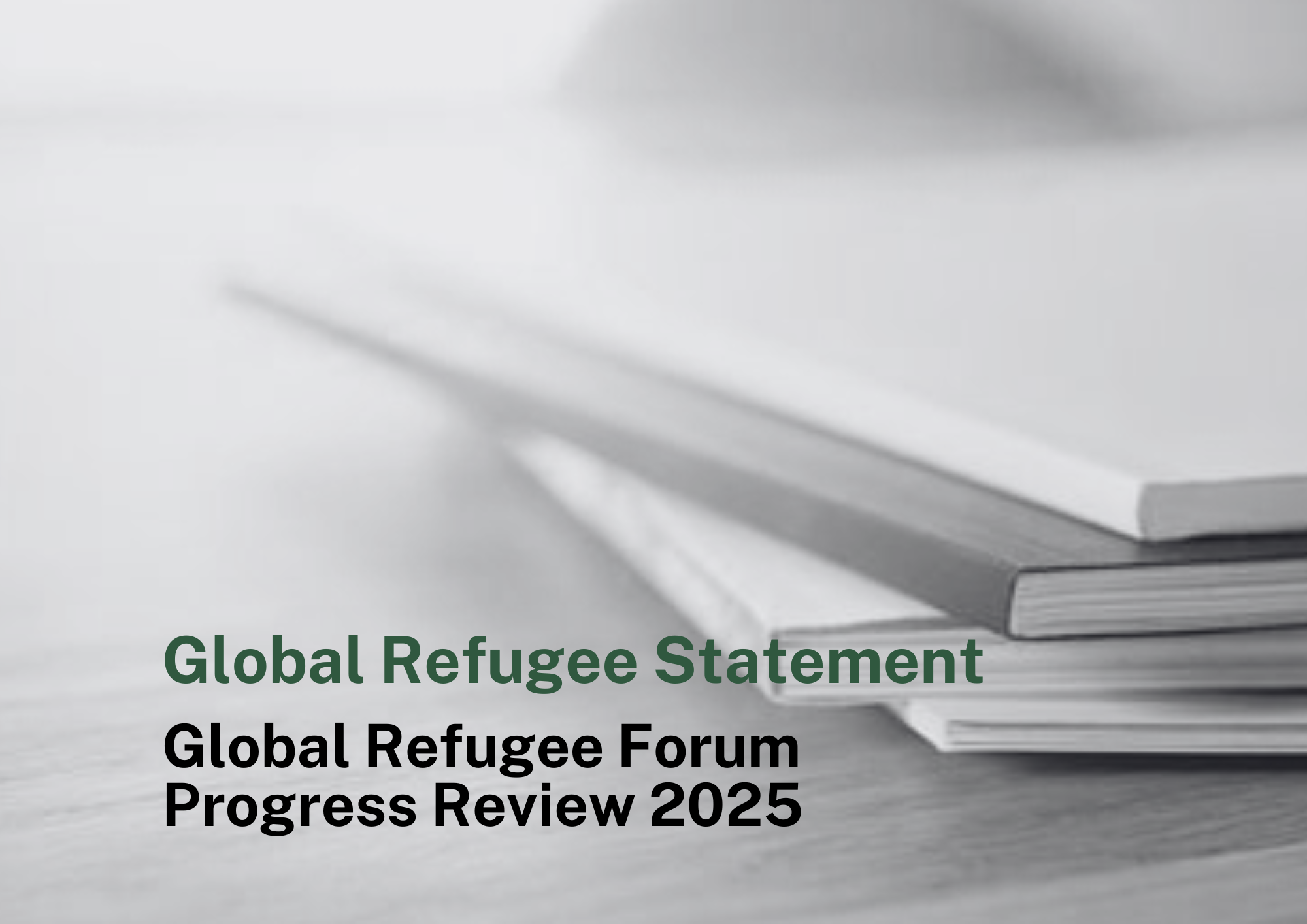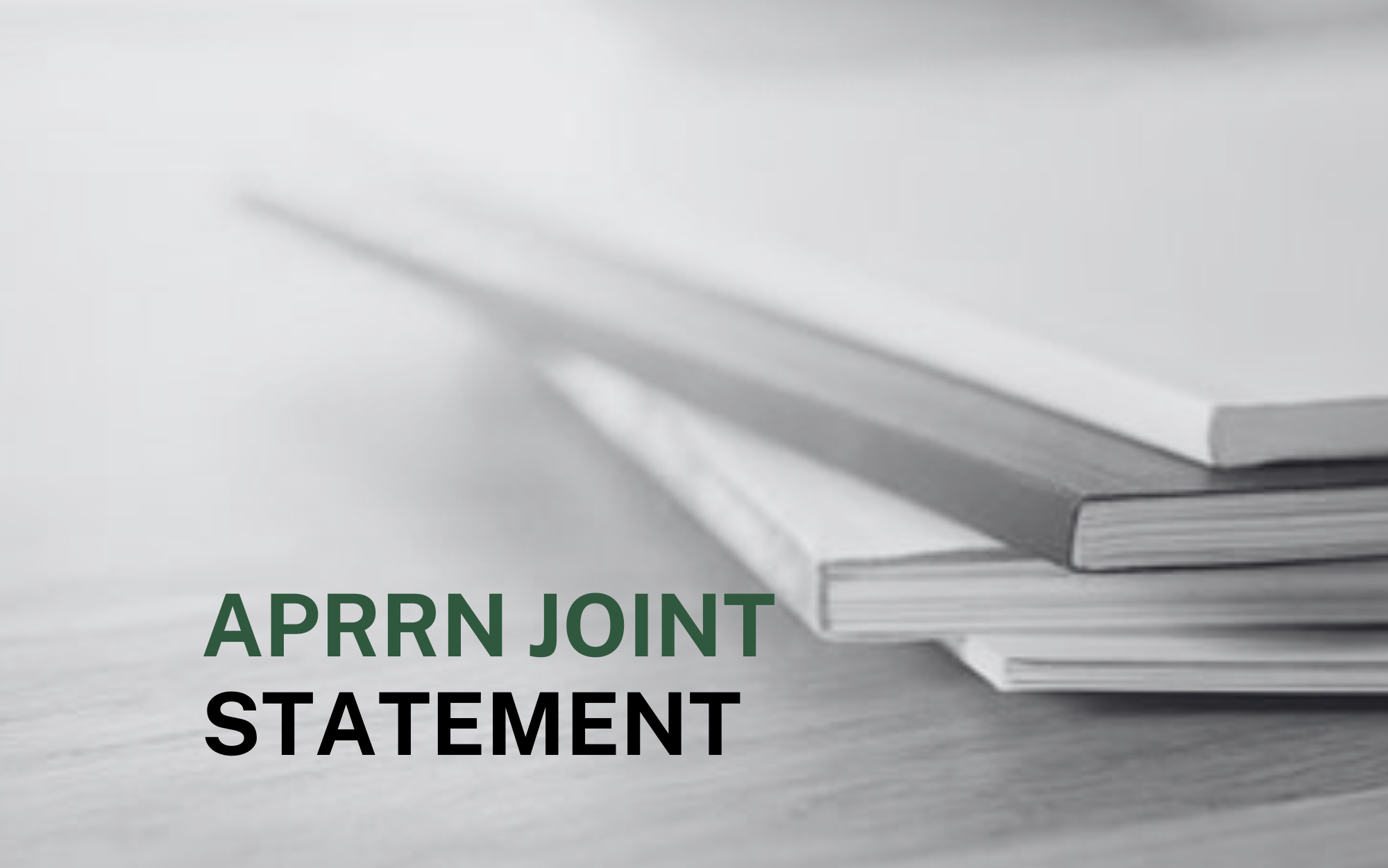URGENT STATEMENT: We ask the Republic of Korea, the first nation in Asia to legislate an independent refugee law, for responsible implementation of the 1951 Refugee Convention
30 December 2020
1 https://nancen.org/1957; http://english.hani.co.kr/arti/english_edition/e_international/898544.html
2 UNHCR, Handbook on Procedures and Criteria for Determining Refugee Status, 2011, para. 199
3 See UNHCR Global Trends: Forced Displacement in 2019.
The Asia Pacific Refugee Rights Network (APRRN) is a network of 450+ civil society organisations and individuals from 29 countries committed to advancing the rights of refugees in the Asia Pacific region. APRRN aims to advance the rights of refugees and other people in need of protection through joint advocacy, capacity strengthening, resource sharing and outreach.
Media Contacts:
Takgon Lee, Attorney at Law, Dongcheon Foundation (APRRN Member)
Tel: 82-2-34047540; Email: takgon.lee@bkl.co.kr
Themba Lewis, Secretary General, APRRN
Tel: +66 (0) 99 481 1595; Email: themba@aprrn.org; Fax: +66 2 234 2679
Janeen Sawatzky, Programme Coordinator, APRRN
Tel: +66 (0) 98 252 5102; Email: janeen@aprrn.org; Fax: +66 2 234 2679
The Republic of Korea was the first nation in Asia to enact comprehensive domestic implementing legislation of its obligations under the 1951 United Nations Convention Relating to the Status of Refugees (Refugee Convention) by adopting the Refugee Act in 2012.
Regional and international refugee rights organizations have watched the proactive efforts of Korea with great expectations. However, after eight years, the situation of refugees within Korea and the government’s current efforts to amend the Refugee Act raise questions about whether Korea has accorded sufficient weight to its obligations and responsibilities as a party to the Refugee Convention.
We note with growing concern that Korea, with a consistently low refugee recognition rate comparatively, has set a new record low in 2019 with a 0.4% recognition rate. The routine practice of denial at border, in violation of international standards and provisions of the Refugee Act that provides for proper refugee status determination for all applications except for prima facie unfounded claims, has resulted in 93.1% of asylum seekers applying for asylum at the border to be denied entry to the Korean territory in 2019.
We also note that since 2015 the Korean Ministry of Justice (MOJ) has attempted to lessen the caseload by arbitrarily identifying certain cases to undergo an accelerated procedure, and during that process numerous interview reports were fabricated to lead to the conclusion that the refugees came to Korea solely for economic reasons.1 There has been no apology or compensation for the victims, and it is reported that many have since left Korea.
The Korean government, with public announcements such as “we will make efforts to filter fake refugees” and “we will strengthen police patrols in areas with a high foreigner population”, clearly attempted to take advantage of xenophobic sentiments that erupted in response to the arrival of approximately 500 Yemeni refugees in Korea in 2018. As a result, numerous draft bills were proposed in the National Assembly in 2018 and 2019 that would have violated Korea’s obligations under the Refugee Convention or even withdraw from the Convention.
While efforts at the National Assembly were unsuccessful, we are deeply concerned that now the MOJ is actively seeking to amend the Refugee Act. The proposed amendment focuses on limiting the scope of asylum seekers who are eligible to access refugee status determination procedures, including the appeal of negative decisions, contrary to provisions of international law. Applicants who are reapplying for refugee status will be given a decision of ineligibility in principle (Article 5-2). However, it is nearly impossible for asylum seekers to provide justification for ‘a major change in circumstances’ within 14 days to counter the decision of ineligibility (Article 5-2 (1) subparas. 1 & 2 and (2)).
Also of concern, the proposal provides the MOJ authority to determine certain applications as ‘manifestly unfounded’, and shortens the time for the determination of any appeal (Article 18-2, 21 (8)). Criteria such as “applying for the sole purposes of extension of sojourn” are irrelevant to the question of refugee status, and will be inevitably biased by concerns of immigration enforcement. Decisions on manifestly unfounded claims should only be made for a very limited number of cases such as claims clearly without any nexus with the stated grounds of persecution; however, the proposal presents ‘conflict between private individuals or economic reasons’ as grounds for manifestly unfounded claims, ignoring the possibility that such facts, in combination with other facts of persecution may be grounds for refugee status, or may by itself be the result of persecution. We are concerned that the introduction of this classification of asylum claims in the current RSD regime that is already burdened with excessively strict procedures and standards, without providing clearly defined criteria that conform with international norm and standards, would result in unduly large number of asylum seekers being labelled as having made ‘manifestly unfounded claims’, with a very low possibility in successfully appealing the negative decision.
The proposal further introduces a number of other provisions that seek to limit the rights of asylum seekers. For example, Article 47 of the proposal reinforces punishment for submission of falsified documents and introduces punishment for those who facilitate such actions. However, Article 31(1) of the Refugee Convention exempts punishment for illegal entry of asylum seekers or refugees, which includes the use of false or falsified documents. UNHCR also recommends that untrue statements by themselves are not a reason for refusal of refugee status; untrue statements or falsified documents must be evaluated in the light of the whole circumstances of the case.2 The proposal does not provide clear criteria on determining the intent or knowledge of the asylum seeker who presents falsified documents or third parties who facilitate such act. The current proposal makes it entirely possible that asylum seekers who unknowingly submitted falsified documents would be punished, as well as lawyers and NGOs who provide assistance. This would result in a severe chilling effect
We further ask the Korean government for caution in responding to the ‘fake refugee’ discourse widely disseminated in the media. Some reports take the view that because asylum seekers from nations with a low risk of persecution (Russian Federation, Kazakhstan, People’s Republic of China, and Malaysia) make up the majority of refugee applicants in Korea, the conclusion is that there are many ‘fake refugees.’ We respectfully disagree. Escape from persecution to another country is dependent upon various factors including the visa policies of other countries and available means of travel. It is natural for asylum seekers from the above-mentioned countries to flee to a country they can enter easily and in geographically close proximity to seek asylum. In this connection it is credibly reported that human rights concerns which may give rise to claims of persecution exist in the above countries, including participation in or sympathizing with opposition movements, harm experienced by persons due to their sexual orientation, or religious beliefs.
China and Russia in particular have been ranked as top refugee-producing countries globally every year for the past several decades.3 As a result, numerous asylum seekers fleeing from those countries have legitimately had their refugee status recognized in other countries and by UNHCR. In stark contrast, it is reported that nationals of the above countries have 0% or nearly 0% possibility of being recognized as refugees in Korea; the correct question then, would be whether the Korea is adhering to the Refugee Convention in determining the refugee status of asylum seekers from Russia, Kazakhstan, China, and Malaysia.
The Asia-Pacific region hosts some 3.5 million refugees, but with a relatively low ratio of states parties to the 1951 Refugee Convention. Only 20 countries out of 45 are currently state parties. This is one of the reasons the situation in Korea, with 30 years’ experience of implementing the Convention, and the first country in the region to implement a domestic refugee law, is being watched closely. The efforts of the government to amend its Refugee Act would result in failure to protect refugees and uphold its obligations under international law.
We are deeply concerned that these developments in Korea may negatively influence other Asian countries, and its actions would be viewed as an emulation of recent regressive trends in refugee protection in several other countries.”
Therefore, APRRN requests the Korean government and UNHCR to consider the following recommendations:
- The Korean government must evaluate the fairness, quality and accountability of its refugee status determination (RSD) procedure in accordance with international law and best practices. In consideration of reported serious errors that have occurred in relation to RSD decisions, and a very low recognition rate from a comparative perspective, the rights of every asylum seeker, and in particular those re-applying for refugee status due to government errors and misconduct, must be ensured. The current procedure at the border must also be improved to ensure access to asylum and protection against non-refoulement.
- Rather than seeking to amend the Refugee Act, the Korean government should focus on increasing its case processing capacity and ensuring quality refugee status determination procedures conducted on the basis of a purely objective legal analysis. The government should also ensure that asylum remains a purely humanitarian act, avoiding politicization and guarding against xenophobia. Any efforts to amend the Refugee Act must be conducted in accordance with Korea’s obligations under the 1951 Refugee Convention, and must involve all crucial stakeholders, including recognized refugees and asylum seekers, Korean civil society organizations, and regional and international organizations including UNHCR.
- APPRN further recommends that UNHCR rigorously exercise its supervisory function under paragraph 8 of the UNHCR Statute and Article 35(2) of the 1951 Refugee Convention with regard to these concerning developments in Korea. As a supportive UN member state since 1991, state party to the Refugee Convention, and nation which has been proudly represented by a former UN Secretary-General and several prominent UN officials, Korea must set a good example of its compliance with principles of international refugee and human rights law. In doing so, UNHCR and other relevant UN actors must provide timely support, guidance and supervision.
-END-
Recommended

Dec. 15, 2025
Global Refugee Statement – Global Refugee Forum Progress Review 2025
Around the world, families are running out of places to go. The scale of global displacement remains extraordinarily high, with 117.3 million people forced to flee, not because they chose to move, but because staying meant persecution, violence, or the collapse of their basic rights and safety. Behind every statistic is a person who once had a home, a community, and a future rooted in the ordinary rhythms of life. This reality reminds us that the systems designed to protect people in times of crisis are under severe strain.

Sept. 22, 2025
Upholding Not Undermining International Law Civil Society Open Letter to States
In advance of this week’s UN General Assembly High-level meeting, speeches by Heads of State and Government and reported efforts to enlist UN Member States in an attempt to undo international legal protections for refugees, 271 civil society organisations released an open letter to UN Member States calling on them to uphold, preserve, strengthen, and celebrate international refugee, human rights, and humanitarian treaties—and to reject efforts to undo or undermine legal norms.

July 21, 2025
APRRN deeply saddened by the loss of Ravi Hemadri
For over 25 years, Ravi dedicated his life to community mobilisation, training, advocacy, and research. Our community of practitioners and advocates working on the rights of refugees and other vulnerable people on the move in Asia Pacific has lost a friend and colleague. But his legacy will continue to inspire those who worked with him. Our heartfelt condolences go out to his family and loved ones.